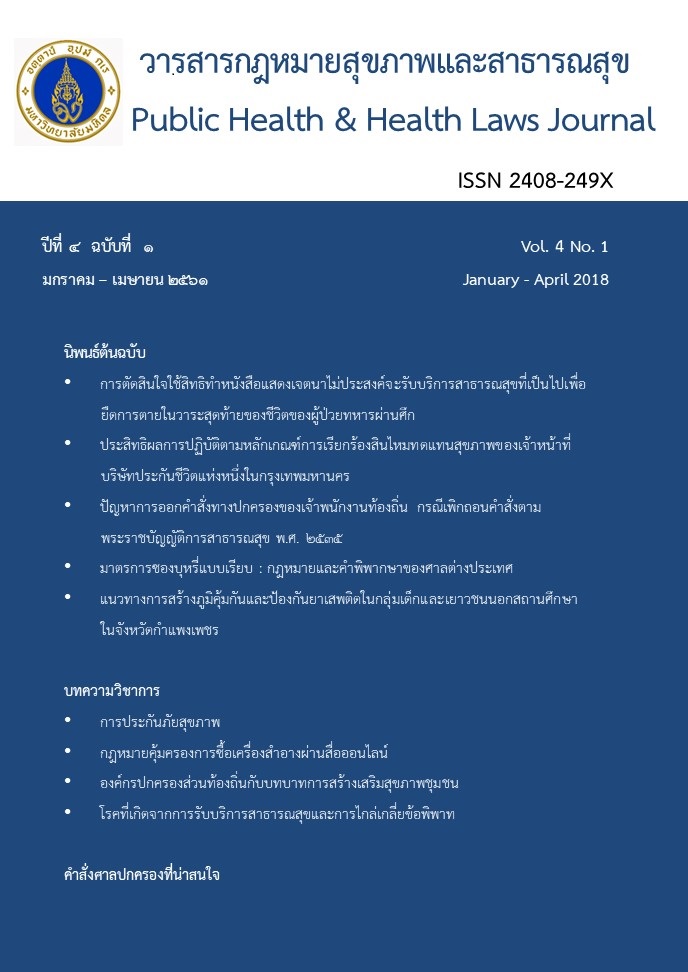Law to Protect the Purchase of Cosmetics through Online Media.
Keywords:
online cosmetics / consumer protection from purchasing online products.Abstract
Rattanaporn Chatmongkol*
Cosmetics marketing through the online media is very popular because it saves time and lower prices than other sales channels. There is an increasing trend of new online marketing of various products through online channel. In terms of controlling the product outlets through online channels, they are not registered as a trade outlet / retails as required by law, and often encountered problems arising from counterfeit goods or contaminants, which can be harmful to consumers. Consumers are not protected and it is not fair that they cannot register a complaint against the online outlet. Therefore, the mistake of shopping online is that consumers and sellers are not meeting face to face, consumers do not know the exact location of the online operators, resulting in unresolved problems with the purchase, since no one is able to apprehend the guilty party.
Therefore, the state should take measures to control trading of cosmetics through online media, because it affects consumers in various ways: economically, environmentally, and product’s image. In order to protect consumers to enjoy the benefits and safety of buying cosmetics through online media, government officials monitoring alone is not enough, but consumers should be educated to choose only products which are certified by government agency. When problems arise from a certified product, consumers can register a complaint and ask for a reasonable damage compensation. While online retailers still do not follow the online trading regulations, they must be punished according to the Ministry of Commerce Act on online trading.
References
จิตราภา ยิ่งยง และ ดุษณี พรมโสดา(2555). การศึกษาพฤติกรรมการเลือกซื้อเครื่องสำอางเกาหลีผ่านระบบอินเตอร์เน็ต.กรุงเทพฯ: มหาลัยศิลปากร
สุขุม กาญจนพิมาย อธิบดีกรมวิทยาศาสตร์การแพทย์ กระทรวงสาธารณสุข (2559).ตรวจ “เครื่องสำอาง” พบกลุ่มครีมหน้าขาว หน้าเด้ง ลอบผสมสารห้ามใช้ 30% [ออนไลน์].เข้าถึงได้ http://www.manager.co.th
พระราชบัญญัติเครื่องสำอาง พ.ศ. 2535. (แก้ไข 2558). ราชกิจจานุเบกษา. ตอนที่ 86 หน้า 5-25.
พระราชบัญญัติคุ้มครองผู้บริโภค พ.ศ. 2522. (2522). ราชกิจจานุเบกษา.ตอนที่ 43 หน้า 25-64.
ประกาศคณะกรรมการกลางว่าด้วยราคาสินค้าและบริการ ฉบับที่ 44 พ.ศ. 2560 เรื่องการแสดงราคาและรายละเอียดเกี่ยวกับการจำหน่ายสินค้าและบริการ ผ่านระบบพาณิชย์อิเล็กทรอนิกส์ หรือออนไลน์ ราชกิจจานุเบกษา ประกาศ ณ วันที่ 24 มกราคม พ.ศ. 2560
ฉัตรสุมน พฤฒิภิญโญ. (2552). การคุ้มครองผู้บริโภค กรุงเทพฯ : เจริญดีมั่นคงการพิมพ์.
เพย์พอล. เปลือยพฤติกรรมคนไทยบ้าช้อป! ใช้จ่ายทะลุกว่า 3 แสนล้าน นิยมซื้อผ่าน “มือถือ” รองจากจีน https://www.brandbuffet.in.th/2017/02/thai-consumer-online-shopping-behavior-paypal/
ภารุจา บุญจารุทัศน์ (2556). การควบคุมการทำธุรกรรมทางอิเล็กทรอนิกส์ผ่านสังคมออนไลน์.กรุงเทพฯ: มหาวิทยาลัยเอแบค
สำนักงานพัฒนาธุรกรรมทางอิเล็กทรอนิกส์ (องค์การมหาชน) (2557). ผลสำรวจพฤติกรรมผู้ใช้อินเทอร์เน็ตไทยประจำปี 2558 และ ETDA เผยพฤติกรรมนักช้อป Thailand Online Mega Sale 2015. https://www.etda.or.th/content/thailand-online-mega-sale-2015-statistics.html
ศุภาสินี โชคงาม และสุมนา ธีรกิตติกุล (2558).ปัจจัยที่มีผลต่อพฤติกรรมการตัดสนใจซื้อเครื่องสําอางนําเข้าจากประเทศเกาหลีในกรุงเทพมหานคร. กรุงเทพฯ:มหาวิทยาลัยกรุงเทพ
ปิยรัตน์ ณ สงขลา. (2546). ปัจจัยที่ใช้ในการเลือกซื้อเครื่องสำอางเพื่อดูแลผิวพรรณของผู้บริโภคในเขตกรุงเทพมหานคร. สารนิพนธ์ปริญญาบริหารธุรกิจมหาบัณฑิต สาขาการตลาด คณะบัณฑิตวิทยาลัย มหาวิทยาลัยศรีนครินทรวิโรฒ
Downloads
Published
How to Cite
Issue
Section
License
Disclaimer and Copyright Notice
The content and information presented in articles published in the Journal of Law and Public Health Policy represent the opinions and sole responsibility of the respective authors. The editorial board does not necessarily agree with or assume any responsibility for the views expressed.
All articles, data, content, images, and other materials published in the Journal of Law and Public Health Policy are the intellectual property of the journal. Any individual or organization wishing to reproduce, distribute, or otherwise use the entirety or any part of such materials must provide proper citation.





